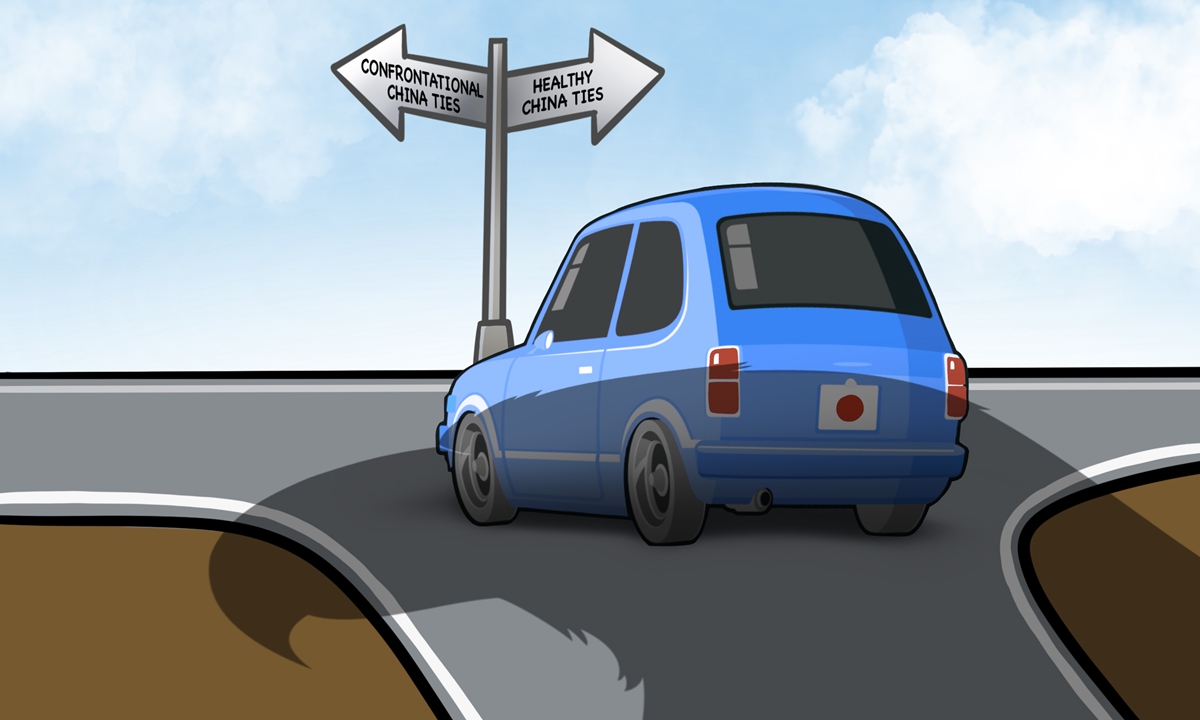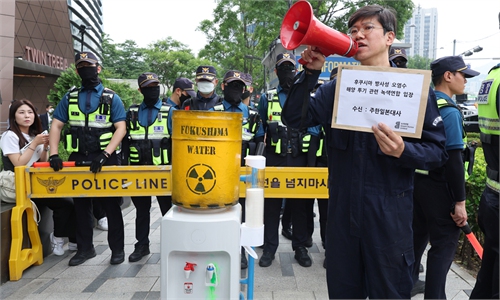
Illustration: Liu Rui/Global Times
Editor's Note:
A series of recent moves by Japan, such as the planned opening of a NATO office, newly announced curbs on exports of chipmaking equipment to China, and developing missile systems with an eye on China, have further dragged down China-Japan relations. In an exclusive interview with Global Times (GT) reporters Xing Xiaojing and Xu Keyue, Huang Xingyuan (Huang), China's representative director of the Japan-China Friendship Center, stressed that only by adhering to the four political documents including China-Japan Joint Statement inked in 1972 can China-Japan relations return to the right track.
GT: This year marks the 45th anniversary of the signing of the China-Japan Treaty of Peace and Friendship. But there are still many unresolved issues between China and Japan. What do you think is the most urgent thing for bilateral ties?
Huang: China-Japan relations have reached a low point in recent years due to a significant regression in Japan's China policy. Some Japanese politicians have been promoting the "China threat" theory and "a Taiwan emergency is a Japanese emergency" narrative, warping the country's diplomacy toward China.
While there are indeed unresolved contradictions between China and Japan, this should not impede overall cooperation between the two nations. We must not lose sight of the future simply because of historical issues. The key lies in how we manage our differences. Only by adhering to the four political documents, including the China-Japan Joint Statement, can bilateral ties return to the right track.
GT: What has led to the freezing relationship between China and Japan?
Huang: After joining the Chinese Ministry of Foreign Affairs in 1986, I worked at the Chinese Consulates General in Nagasaki and Osaka from 1989 to 1995. During that time, based on frequent local exchanges, I felt that friendship was the main theme of bilateral relations. However, since 2001, incidents such as "then Japanese prime minister Junichiro Koizumi visiting the infamous Yasukuni Shrine" and the "Chinese activists landing on the Diaoyu Islands in 2004" occurred one after another. Despite this, under the circumstances of "cold politics and warm economy," China-Japan relations had been otherwise under control as a whole.
At the end of 2020, I returned to Japan to serve as China's representative director of the Japan-China Friendship Center. I gradually noticed that the relationship between China and Japan is becoming increasingly strained, with "cold political exchanges" and "subdued people-to-people exchanges" that have never occurred since the normalization of diplomatic relations between China and Japan. The main reason for this phenomenon is Japan's increasingly retrogressive China policy in recent years, which has pushed bilateral relations into a dangerous situation. It is necessary to take action to save the relationship before it's too late.
The Japanese government, at the end of last year, launched a new version of the National Security Strategy and two other security documents, labeling China as the "biggest strategic challenge," which is consistent with the US' strategic positioning toward China. Japan's short-sighted politicians have ignored the development of China-Japan relations and copied the US' China policy. This runs counter to Japan's security, economic and future development interests. This has brought China-Japan relations to a new crossroads, which is very worrying.
GT: Following Japanese Foreign Minister Yoshimasa Hayashi's visit to China in early April, there have been some media reports claiming that Toshihiro Nikai, chairman of the Japan-China Friendship Parliamentarians' Union, plans to visit China in June. Will this, to some extent, help China and Japan effectively manage their differences?
Huang: The Japanese government is expected to slowly return to the right track after making detours in its diplomacy with China. To reverse the unhealthy direction of China-Japan ties, we should pin our hopes on the more frequent exchanges and communications between the two countries.
For example, in 2022, which marked the 50th anniversary of the normalization of China-Japan relations, there were nearly 200 events surrounding people-to-people exchanges facilitated through the Japan-China Friendship Center. This warm atmosphere created through open events remains important, and the friendship between China and Japan has become a real demand in the people-to-people sphere. More and more far-sighted people believe it is time to quickly restore friendly exchanges among the people and inject increased vitality into China-Japan relations.
GT: What are your expectations for the future China-Japan relations?
Huang: Based on my immersive observation of Japanese society in the past two years or so, I feel that China-Japan relations are a combination of the two countries' government relations, security relations, people-to-people relations, cultural exchanges and other aspects. Japan's local governments have a more positive attitude toward China-Japan relations than the central government, and the Japanese people are more friendly than the government. It is worth mentioning that Japan's recent official poll results showed that compared with other age groups, Japan's "Generation Z" has the highest favorable rating for China, and young people have a stronger sense of closeness to China than older people.
The Japan-China Friendship Center frequently organizes online and offline communications between young people from both countries. The communication is frank and sincere, and they generally hold a positive outlook on bilateral ties. As the future belongs to young people, I stand with them and hope for improved China-Japan relations despite any obstacles.
GT: How do you see the seemingly warming ties between Japan and South Korea? How will it affect China-Japan relations?
Huang: The resumption of "shuttle diplomacy" between Japan and South Korea after 12 years is noteworthy. In March, a South Korean government-backed foundation announced that it would pay compensation on behalf of defendant Japanese enterprises to surviving Korean plaintiffs who won lawsuits over wartime forced labor during Japan's colonial rule. Seoul's move was criticized for "humiliating" the country. Later, South Korean President Yoon Suk-yeol and Japanese Prime Minister Fumio Kishida quickly resumed mutual visits, giving the outside world an impression of the "warming Japan-South Korea relations."
The friendship between Japan and South Korea is currently in an abnormal state, and Seoul is asking for an improvement in relations with Tokyo in a self-harming way.
The so-called warming of Japan-South Korea relations is, in some sense, a temporary friendship forced by the US. While some people may applaud it, in general, the Japanese and South Korean people do not have high expectations for such a reconciliation that is too eager for quick results.
There are intractable conflicts and differences between Japan and South Korea, with history and reality difficulties intertwined. The issue of Japan's dumping of the nuclear-contaminated wastewater from the Fukushima Daiichi nuclear power plant into the sea has added fuel to the flames.
The Japanese government has the responsibility and obligation to explain the concerns of the outside world over the contaminated wastewater issue and should work with the international community, including China, South Korea and other countries, to solve the problem.
China, Japan and South Korea are each other's important economic and trade partners, and China is glad to see the improvement in bilateral relations between Japan and South Korea. But the premise is that they don't engage in a closed and exclusive "small circle," but truly develop relations in a direction conducive to regional peace, stability and prosperity.


